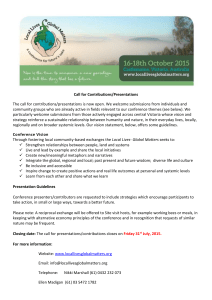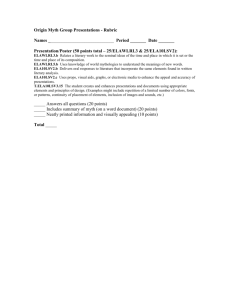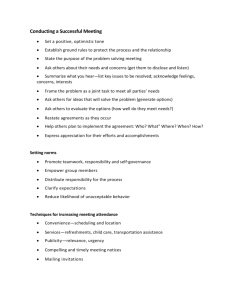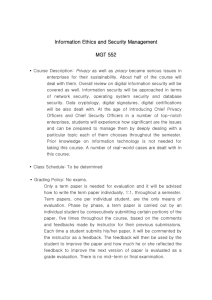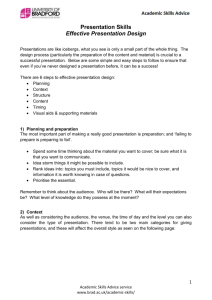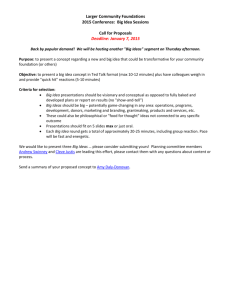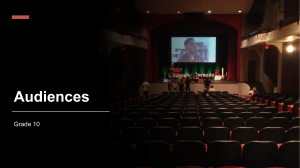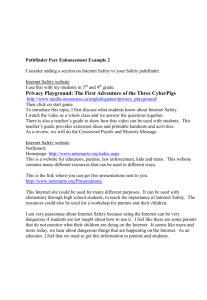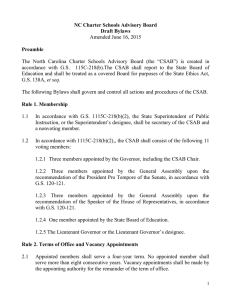CS 415 "Social Implications of Computing"
advertisement
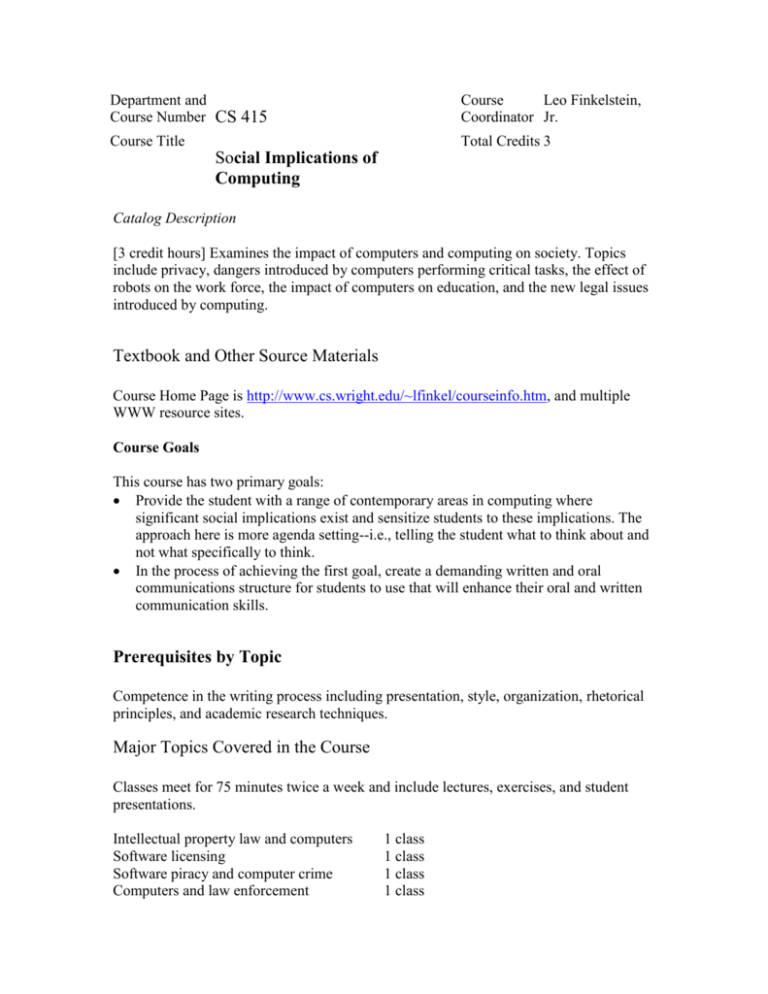
Department and Course Number CS 415 Course Leo Finkelstein, Coordinator Jr. Course Title Total Credits 3 Social Implications of Computing Catalog Description [3 credit hours] Examines the impact of computers and computing on society. Topics include privacy, dangers introduced by computers performing critical tasks, the effect of robots on the work force, the impact of computers on education, and the new legal issues introduced by computing. Textbook and Other Source Materials Course Home Page is http://www.cs.wright.edu/~lfinkel/courseinfo.htm, and multiple WWW resource sites. Course Goals This course has two primary goals: Provide the student with a range of contemporary areas in computing where significant social implications exist and sensitize students to these implications. The approach here is more agenda setting--i.e., telling the student what to think about and not what specifically to think. In the process of achieving the first goal, create a demanding written and oral communications structure for students to use that will enhance their oral and written communication skills. Prerequisites by Topic Competence in the writing process including presentation, style, organization, rhetorical principles, and academic research techniques. Major Topics Covered in the Course Classes meet for 75 minutes twice a week and include lectures, exercises, and student presentations. Intellectual property law and computers Software licensing Software piracy and computer crime Computers and law enforcement 1 class 1 class 1 class 1 class Computers and personal privacy Workplace changes and health hazards Medicine, health care and ergonomics Electronic commerce and banking Education, entertainment, special effects Review: Oral presentations and visuals Review: Documentation, style and grammar 1 class 1 class 1 class 1 class 1 class 1 class 1 class Estimate CSAB Category Content Core Advanced Data Structures Algorithms Software Design Core Advanced Concepts of PL Comp Organization + Architecture Other 3 Oral and Written Communications The course requires two major written assignments and two oral presentations (one associated with each written assignment). Proposal Document and Presentation: Students receive a formal Request for Proposal (RFP) for this assignment. Students in this course must come up with a topic that addresses a social dimension of computing technology, and must develop a complete research report on that topic. Students first produce a six-page proposal by which the proposed research topic is submitted for approval. This assignment not only gives students more experience in developing a coherent, organized, meaningful written document, it also requires them to think about the topic, and it provides experience in problem definition and analysis. Students must also deliver a fiveminute oral presentation to the class on their proposed topic. This presentation gives them experience in extemporaneous presentation and communicates to the entire class what topic each member is working on. Research Report Document and Presentation: Students are expected to develop a quality research report on their topic. They are expected to do meaningful and substantial research into their topic, properly documenting all sources, and providing a professional product in the form of a formal research report at least 10 pages in length, not counting front material, abstract, references, or appendices. This project is designed to teach them to manage and execute a written research project, including all the tasks involved. It provides them not only more in-depth knowledge on their social implications of computing topic, but it also gives them the opportunity to further refine their writing skills. The Research Report Presentation is a 10-15 minute formal briefing, normally using Powerpoint charts, that deals in some manner with all or part of their research topic. The purpose of this assignment is to give students more experience in developing and delivering a formal briefing. Social and Ethical Issues The class lecture and discussion topics vary somewhat quarter to quarter depending on what issues are contemporary. However, as a rule, the class looks at the social implications of computing relative to the following topic areas: intellectual property and software licenses, piracy and computer crime, computers and law enforcement, invasion of privacy, healthcare and health hazards, e-commerce and on-line trading, education and entertainment, and critical reliance in the workplace. Problem Analysis In this course, this primarily relates to a student coming up with a topic, then analyzing what needs to be done to create a meaningful and professional research project on that topic. In some cases, students may develop original research instruments relying on proper and adequate statistical controls. In most cases, however, they will rely on significant research sources available in the library, on the Web, and through their contact with experts in the field. Solution Design The overall design of the proposal and research report are provided to the student, and the student generally must follow this direction. Students have more flexibility to alter designs in the oral presentations.

